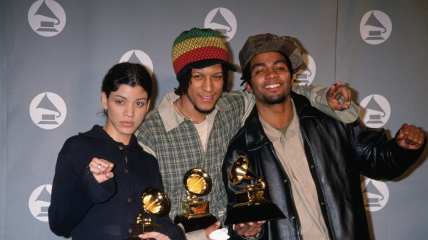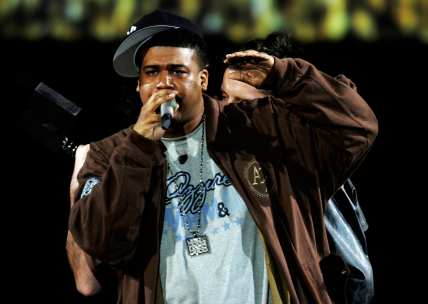How 2Pac made dichotomy iconic with ‘Strictly 4 My N.I.G.G.A.Z’ and its two biggest hits
OPINION: In recognition of the 30th anniversary of 2Pac's sophomore release, theGrio examines how the contradicting themes of the album's biggest singles,"Keep Ya Head Up," and "I Get Around," codified the polarizing artistry that made the late rapper an icon.

Editor’s note: The following article is an op-ed, and the views expressed are the author’s own. Read more opinions on theGrio.
Tupac Shakur was as famous for the contradictions in his music as he was for the music itself. In one breath, the late MC known as 2Pac created cautionary tales like “Brenda’s Got a Baby,” or a tribute to his mother with “Dear Mama.” In another breath, he could just as easily churn out songs like “All Bout U,” “Hit ‘Em Up,” and “2 of Amerikaz Most Wanted,” glorifying hedonistic behavior, vengeful manipulation and violence, and misogynistic dismissiveness.
The world got to know 2Pac from his affiliations with Digital Underground and his acclaimed 1991 solo debut, “2Pacalypse Now.” But the unfiltered, angry, cynical, playful 2Pac the world remembers today is the one heard on 1993’s “Strictly 4 My N.I.G.G.A.Z.,” released 30 years ago today.
Before 2Pac, hip-hop had seldom seen an MC that wrote and rhymed with such unveiled in-real-time emotion. Like most transcendent Black American artists, 2Pac’s catalog contains songs with a wide breadth of themes. But where 2Pac stands alone is the blatant, unchecked polarity of his messaging within an album.

Many artists have been able to record songs that were left turns from each, but never veered too far off the path. Bob Marley was able to have “Concrete Jungle” and “Kinky Reggae” on the same album, and N.W.A. went from “F–k Tha Police” to “Express Yourself.”
In 2Pac’s case, such differing perspectives and viewpoints that occur within a single body of work were wildly opposite from each other. On the surface, it seems like hypocrisy or a lack of moral foundation. Under the surface, you realize this was a 21-year-old man, still operating from the fumes of adolescence, giving back what the world was throwing at him.
While its predecessor, “2Pacalypse Now,” was driven by poignant, introspective storytelling like “Brenda’s Got a Baby,” “Strictly” is fueled by reactionary emotion, like on “Point The Finga” and righteous indignation like “Holler If Ya Hear Me,” and “The Streetz R Deathrow.”
It’s important to remember that 2Pac is a product of dueling influences from his formative years. On the one hand, he was raised under the umbrella of the Black Panthers and Black Liberation Army movement via his mother (Afeni Shakur), stepfather (Mutulu Shakur), and godfather (Geronimo Pratt). On the other hand, he was engulfed in an urban plight that plagued many Black communities.
The duality of 2Pac drove his idiosyncratic artistry and persona, codified on “Strictly” with the inclusion of two of his most famous songs, two songs that couldn’t be any more diametrically opposed: “Keep Ya Head Up” and “I Get Around.”
“Keep Ya Head Up” is as uplifting a song as has ever been recorded in hip-hop history. It’s a plea to not only uplift Black women who have felt slighted, misused, and taken advantage of for generations, but also a declaration of embracing one’s Blackness. During the first verse, he asks why so many Black men mistreat Black women and turn them into single mothers.
“And since we all came from a woman, got our name from a woman and our game from a woman,
I wonder why we take from our women, why we rape our women, do we hate our women,
I think it’s time that we kill for our women, time to heal our women, be real to our women,
And if we don’t, we’ll have a race of babies that will hate the ladies that make the babies,
And since a man can’t make one, he has no right to tell a woman when and where to create one”
This type of rhetoric is beautifully and disappointingly prophetic to today’s times. 2Pac rhymes with controlled gentility, matching his tone with his lyrics masterfully. “Keep Ya Head Up” is as critical as it is encouraging. That’s song No. 11 on the track listing. Waiting at song No. 14 is “I Get Around.”
“I Get Around” is the diametric opposite of “Keep Ya Head Up.” Though tame in comparison to songs that came before and after it, the song is at times, as disrespectful as “Keep Ya Head Up” is the epitome of respect. Featuring members of Digital Underground, the song finds 2Pac waxing poetic about sexual exploits, condemning women for withholding sex despite putting themselves in situations that imply the expectation of sex. Strangely enough, he encouraged such behavior earlier in the song when he raps, “hate to sound sleazy, but tease me, I don’t want it if it’s that easy.”
In “Keep Ya Head Up,” 2Pac uses the terms “women” and “ladies” while in “I Get Around,” he uses terms like “hoes” and “groupie.” On “I Get Around,” 2Pac employs the stigmatic rap tropes of objectifying women and taking pride in having multiple partners and being romantically rootless. This is explained with lyrics like, “All respect for those who break their neck to keep their hoes in check” or “And I’ll be there in a jiffy, don’t be picky, just be happy with this quickie. But when you learn, you can’t tie me down; baby doll, check it out, I get around.”
There is great intention and conviction in both songs, even in their respective production. “Keep Ya Head Up” samples Zapp’s “Be Alright” and its hook interpolates the comforting refrain of The Five Stairsteps’ biggest hit: “Ooh child, things are gonna get easier.”
Meanwhile, “I Get Around” also samples “Zapp,” in the form of “Computer Love.” Only this time, the top of the second verse, “you know I get around.” After listening to this album and this song from the same LP, some begin to wonder who the real 2Pac was. Was he a righteous man who wrote “Keep Ya Head Up” and stooped to the level of “I Get Around” to appease certain audiences? Was he the devil-may-care rapper of “I Get Around” who was pandering to a wider audience by writing “Keep Ya Head Up?”
He was both. It’s evident in the title, “Strictly For My N.I.G.G.A.Z.” The “N.I.G.G.A.” stands for “Never Ignorant in Getting Goals Accomplished.” It’s simultaneously a statement of exclusiveness to a particular demographic while also being a declaration of focus and discipline.
It’s clear from his production and delivery that whatever 2Pac says at the time, he means it 100% at that time. All human beings have moments, emotions and actions that contradict preceding actions, moments and emotions. Does it mean we are all hypocrites?
What is true is that 2Pac’s fearless ability to reveal every part of himself at the moment with little concern about whether or not the juxtaposition of the songs made thematic sense is what made him a singular and influential artist.
It was the conviction in his raps and his decision-making with accenting and emoting precise words and phrases that made his polarity alluring and relatable when another artist might be taken to task for inconsistencies.
Kendrick Lamar has benefited from 2Pac’s vast array of expressions. On “The Blacker the Berry,” he called himself the “biggest hypocrite of 2015.” One of the most important MCs of the 21st century goes back and forth between expressing his devotion to the tenets of Christianity while boldly admitting that he has at times succumbed to peer pressure and self-destructive behavior.
2Pac’s influence on acts like Lamar, J. Cole, Kanye West, and other important rappers of the last two decades can be summed up in Lamar’s “Ab-Soul’s Outro”
“…The next time I talk about money, hoes, clothes, God, and history all in the same sentence
Just know I meant it, and you felt it
‘Cause you too are searching for answers
I’m not the next pop star, I’m not the next socially aware rapper,
I am a human motherf—ing being over dope-ass instrumentation.”
And that is who 2Pac was. A human motherf—ing being who meant what he said and the world felt it whenever he did.

Matthew Allen is an entertainment writer of music and culture for theGrio. He is an award-winning music journalist, TV producer and director based in Brooklyn, NY. He’s interviewed the likes of Quincy Jones, Jill Scott, Smokey Robinson and more for publications such as Ebony, Jet, The Root, Village Voice, Wax Poetics, Revive Music, Okayplayer, and Soulhead. His video work can be seen on PBS/All Arts, Brooklyn Free Speech TV and BRIC TV.
TheGrio is FREE on your TV via Apple TV, Amazon Fire, Roku and Android TV. Also, please download theGrio mobile apps today!
More About:Black History Month Opinion Music Entertainment









